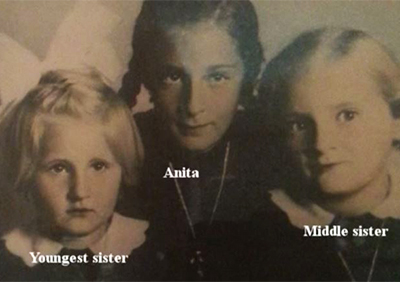The assignment was fairly simple: Film a 10-12 minute video of a high school staff member to show the interviewing techniques learned in class. For two students, though, the assignment taught them the power of video, a history lesson and what can happen when you go the extra mile.
Taking It Further
Thornapple Kellogg tenth-graders Rachael Ranes and Hayley Bashore asked their teacher Jerry Robinson to make an exception to the assignment requirements and interview a person outside of the school, which he approved. The person was 85-year-old Anita Thorpe, a German who had lived through World War II and the Holocaust.
Students would be graded on what they had learned in class about interviewing. Good posture, posing questions that couldn’t be answered with just a yes or no, and using the microphone correctly were examples of this. “You don’t want to be eating the microphone or else it sounds like a jumble of words,” Rachael said. “You don’t want to mumble.”
Anita’s story fascinated them, and they got much more video than needed. Then Robinson changed the assignment. He told the class the imaginary station manager had called and the TV show they were shooting for said they could only use three to three-and-a-half minutes of the video they had shot. The change was intended to teach them editing and what could happen in the real world, he said.
Because the girls had about 45 minutes instead of the suggested 10-12, Robinson gave them permission to doing a longer, six-minute video, which they framed like a movie trailer. Still, they were disappointed in how much they had to cut. After they submitted their short video for class, the girls created a longer, 36-minute video.
The Interview
Anita turned out to be a perfect interview subject. “She was an absolute ball of energy,” said Rachael, who asked the questions. “She wanted people to know what really happened, so she wasn’t afraid to tell her story.”
Among Anita’s many stories about the war was one about being trapped in the basement for 18 hours after her family’s house was bombed. Soldiers finally got her out by moving a body that was underneath her. She knew it was either her sister or mother but never asked.
“It was a unique perspective of a non-Jewish person living in Germany during World War II, Hayley said. “”It’s very rare you hear just how bad it was on the other side. Her survival was an absolute miracle,” Rachael said. “When interviewing her, it was hard to believe that this really happened, but it did.”
A Sad and Happy Ending
Anita died unexpectedly just before Christmas before she could see the video. At the funeral, family members talked about how sad they were that had no recordings of her voice — even if it was just on an answering machine message — so they could remember it.
But they hadn’t lost her voice or her story at all. It was right there on the video the girls made that the family didn’t know about. Rachael’s mother gave them copies at the funeral.
What They Learned
For Hayley and Rachael’s generation, viewing videos online has become ubiquitous. Something you shoot in a little town in mid-Michigan can be seen around the world if it goes viral. The assignment also taught them, “how if it’s used right, it can be very powerful and influential,” Hayley said.
It’s that power that Robinson teaches to students in his class. “It can make a person laugh or cry. It can entertain or educate. It can combine all of those and more. But, video can also destroy.”

He gives two examples of that: One is of a video of NFL football player Ray Rice’s domestic assault of his girlfriend in a New Jersey. Once a video of it was seen, he got a longer suspension, and the NFL was attacked for how it handled domestic violence cases. “Why the change? People could see it with their own eyes,” Robinson said. Another example he tells his students about is the Los Angeles riots in 1992, when Rodney King was beaten by police officers, and the officer was later acquitted of charges. “If there wasn’t video of the beatings, would there have been riots, 53 dead and a billion dollars in damage?” he asks.
“Video can bring people together, it can save lives, it can tell a story, convince voters.”
It also can save precious memories. “It was the perfect gift, to see her and hear her,” said Jacqueline Childs, one of Anita’s daughters, about what the girls had filmed. “There’s no way to ever repay them.”









